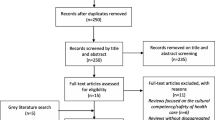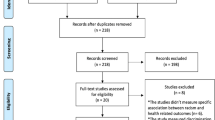Abstract
Cultural consonance is the degree to which individuals, in their own beliefs and behaviors, approximate widely shared cultural models. In previous research in Brazil and the United States we found that higher cultural consonance in the cultural domains of lifestyle and social support was associated with lower psychological distress. The aim of this paper is to expand on these results in two ways. First, the measurement of cultural consonance has been improved through a closer link of cultural domain analyses and survey research. Second, the number of domains in which cultural consonance has been examined has been expanded to include—along with lifestyle and social support—family life, national identity, and food. We found that cultural consonance in these five domains can be conceptualized as two latent variables of generalized cultural consonance, and that this generalized cultural consonance is associated with lower psychological distress. These results continue to support the usefulness of cultural consonance as a theoretical construct in the explanation of human social suffering.
Similar content being viewed by others
References
Almeida-Filho, Naomar (1987) Becoming Modern After All These Years. Culture, Medicine and Psychiatry 22(3):285–316.
Almeida-Filho, Naomar, Ines Lessa, Lucélia Magalhães, Maria Jenny Araújo, Estela Aquino, Sherman A. James, and Ichiro Kawachi (2004) Social Inequality and Depressive Disorders in Bahia, Brazil. Social Science and Medicine 59(7):1339–1353.
Anderson, Benedict (1993) Imagined Communities: Reflections on the Origin and Spread of Nationalism. London: Verso.
Antonovsky, Aaron (1981) Health, Stress, and Coping. San Francisco, CA: Jossey-Bass.
Atran, Scott, Douglas L. Medin, and Norbert O. Ross (2005) The Cultural Mind. Psychological Review 112(4):744–776.
Averbug, A. (2002) The Brazilian Economy in 1994–1999: From the Real Plan to Inflation Targets. World Economy 25(7):925–944.
Berger, Peter L., Thomas Luckman (1966) The Social Construction of Reality. Garden City, NY: Doubleday.
Bourdieu, Pierre (1990) In Other Words: Essays toward a Reflexive Sociology. M. Adamson, trans. Stanford, CA: Stanford University Press.
Burns, E. Bradford (1993) A History of Brazil. 3rd ed. New York: Columbia University Press.
Caulkins, D. Douglas (2001) Consensus, Clines, and Edges in Celtic Cultures. Cross-Cultural Research 35(2):109–126.
Cohen, Sheldon, Thomas Karmarck, and Robert Mermelstein (1983) A Global Measure of Perceived Stress. Journal of Health and Social Behavior 24(4):385–396.
Cooper, Catherine R., and Jill Denner (1998) Theories Linking Culture and Psychology. Annual Review of Psychology 49:559–584.
Coreil, Jeannine, and Patricia Marshall (1982) Locus of Illness Control: A Cross-Cultural Study. Human Organization 41(2):131–138.
Crossley, Nick (2001) The Phenomenological Habitus and Its Construction. Theory and Society 30(1):81–120.
D’Andrade, Roy G. (1984) Cultural Meaning Systems. InCulture Theory: Essays on Mind, Self and Emotion. Richard A. Schweder and Robert A. Levine, eds., pp. 88–119. Cambridge: Cambridge University Press.
(1992) Schemas and Motivation. InHuman Motives and Cultural Models. Roy D’Andrade and Claudia Strauss, eds., pp. 23–44. Cambridge: Cambridge University Press
(1995) The Development of Cognitive Anthropology. Cambridge: Cambridge University Press.
da Matta, Roberto (1985) A Casa e a Rua. São Paulo, Brasil: Editora Brasiliense.
de Munck, Victor (2000) Culture, Self, and Meaning. Prospect Heights, IL: Waveland Press.
Dohrenwend, Bruce P., and Barbara S. Dohrenwend (1969) Social Status and Psychological Disorder: A Causal Inquiry. New York: Wiley.
Dressler, William W. (1985) Psychosomatic Symptoms, Stress, and Modernization: A Model. Culture, Medicine and Psychiatry 9(3):257–286.
(1991) Stress and Adaptation in the Context of Culture: Depression in a Southern Black Community. Albany: State University of New York Press.
(2004) Culture and the Risk of Disease. British Medical Bulletin 69:21–31.
(2005) What’s Cultural about Biocultural Research? Ethos 33(1):20–45.
Dressler, William W., and James R. Bindon (2000) The Health Consequences of Cultural Consonance: Cultural Dimensions of Lifestyle, Social Support, and Arterial Blood Pressure in an African American Community. American Anthropologist 102(2):244–260.
Dressler, William W., and José Ernesto Dos Santos (2001) Correlaçoes sociais e culturais com a pressão arterial: os estudos de Dressler e Dos-Santos. Revista Brasileira de Hipertensão 8(2):225–229.
Dressler, William W., Mauro C. Balieiro, and Jose Ernesto Dos Santos (1997) The Cultural Construction of Social Support in Brazil: Associations with Health Outcomes. Culture, Medicine and Psychiatry 21(3):303–335.
(1998) Culture, Socioeconomic Status and Physical and Mental Health in Brazil. Medical Anthropology Quarterly 12 (4):424–446.
(2002) Cultural Consonance and Psychological Distress. Paidéia: Cadernos de Psicologia e Educação 12(22):5–18.
Dressler, William W., Mauro C. Balieiro, Rosane P. Ribeiro, and José Ernesto Dos Santos (2005) Cultural Consonance and Arterial Blood Pressure in Urban Brazil. Social Science and Medicine 61(3):527–540.
Dressler, William W., Camila D. Borges, Mauro C. Balieiro, and José Ernesto Dos Santos (2005) Measuring Cultural Consonance: Examples with Special Reference to Measurement Theory in Anthropology. Field Methods 17(4):331–355.
Dressler, William W., Jose Ernesto Dos Santos, and Mauro Campos Balieiro (1996) Studying Diversity and Sharing in Culture: An Example of Lifestyle in Brazil. Journal of Anthropological Research 52(4):331–353.
Dressler, William W., Jose Ernesto Dos Santos, Philip N. Gallagher, Jr., and Fernando E. Viteri (1987) Arterial Blood Pressure and Modernization in Brazil. American Anthropologist 89(2):389–409.
Dressler, William W., Rosane P. Ribeiro, Mauro C. Balieiro, Kathryn S. Oths, and José Ernesto Dos Santos (2004) Eating, Drinking and Being Depressed: The Social, Cultural and Psychological Context of Alcohol Consumption and Nutrition in a Brazilian Community. Social Science and Medicine 59(4):709–720.
Finch, B. K., R. Frank, and William A. Vega (2004) Acculturation and Acculturation Stress: A Social-Epidemiological Approach to Mexican Migrants Farmworkers’ Health. International Migration Review 38(1):236–262.
Gaines, Atwood D., and Paul E. Farmer (1986) Visible Saints: Social Cynosures and Dysphoria in the Mediterranean Transition. Culture, Medicine and Psychiatry 10(3):295–330.
Good, Byron (1994) Medicine, Rationality, and Experience. Cambridge: Cambridge University Press.
Goodenough, Ward H. (1996) Culture. InEncyclopedia of Cultural Anthropology. David Levinson and Melvin Ember, eds., pp. 291–299. New York: Henry Holt.
Gorer, Geoffrey (1948) The American People: A Study in National Character. New York: Norton
Guarnaccia, Peter J., and Orlando Rodriguez (1996) Concepts of Culture and Their Role in the Development of Culturally Competent Mental Health Services. Hispanic Journal of Behavioral Sciences 18(4):419–443.
Handwerker, W. Penn (2001) Quick Ethnography. Walnut Creek, CA: AltaMira Press.
Jaskyte, Kristina, and William W. Dressler (2004) Studying Culture as an Integral Aggregate Variable: Organizational Culture and Innovation in a Group of Nonprofit Organizations. Field Methods 16(3):265– 284
Jenkins, Janis Hunter (2004) Specifying Culture, Self, and Experience. InSchizophrenia, Culture, and Subjectivity. Janis Hunter Jenkins and Robert Johns Barrett, eds., pp. 29–61 Cambridge: Cambridge University Press.
Jenkins, Janis Hunter, and Robert Johns Barrett (2004) Introduction. In Schizophrenia, Culture, and Subjectivity. Janis Hunter Jenkins and Robert Johns Barrett, eds., pp. 1–28. Cambridge: Cambridge University Press.
Kaplan, George A. (1995) Where Do Shared Pathways Lead? Psychosomatic Medicine 57(3):208–212
Keesing, Roger M. (1974) Theories of Culture. In Annual Review of Anthropology. Vol. 3. Bernard J. Siegel, Alan R. Beals, and Stephen A. Tyler, eds., pp. 73–97. Palo Alto, CA: Annual Reviews.
Kleinman, Arthur (1988) Rethinking Psychiatry. New York: Free Press
Kuper, Adam (1999) Culture: The Anthropologists’ Account. Cambridge, MA: Harvard University Press.
Leite, Dante Moreira (2002) O Caráter Nacional Brasileiro. 6th ed. São Paulo, Brazil: Editora UNESP.
Lopez, Steven R., and Peter J. Guarnaccia (2000) Cultural Psychopathology. Annual Review of Psychology 51:571–598.
Maercker, Andreas (2001) Association of Cross-Cultural Differences in Psychiatric Morbidity with Cultural Values. German Journal of Psychiatry 4(1):17–23.
Manuck, Stephen B., and Jay R. Kaplan (1999) Status, Stress, and Atherosclerosis: The Role of Environment and Individual Behavior. Annals of the New York Academy of Sciences 896:145–161.
Newkirk, Christine N., Kathryn S. Oths, William W. Dressler, and José Ernesto dos Santos In press Intracultural Diversity in Food Knowledge in Southern Brazil. Ecology of Food and Nutrition 42(4):303–324
Nichter, Mark (1981) Idioms of Distress. Culture, Medicine and Psychiatry 5(4):379–408.
Oths, Kathryn S., Adriana Carolo, and José Eduardo Dos Santos (2003) Social Status and Food Preference in Southern Brazil. Ecology of Food and Nutrition 42(4):303–324.
Palinkas, L. A., J. Russell, M. A. Downs, and J. S. Petterson (1992) Ethnic Differences in Stress, Coping, and Depressive Symptoms After the Exxon Valdez Oil-Spill. Journal of Nervous and Mental Disease 180(5):287–295.
Pastore José (1982) Inequality and Social Mobility in Brazil. Madison: University of Wisconsin Press.
Rezende, Fernando (1998) Brazilian Economy: Recent Developments and Future Prospects. International Affairs 74(3):563–575
Ribeiro, Darcy (1995) O Povo Brasileiro. São Paulo, Brazil: Companhia das Letras.
Rodspeth, Lars (1998) Distributive Models of Culture. American Anthropologist 100(1):55–69.
Rohner, Ronald P. (1984) Toward a Conception of Culture for Cross-Cultural Research. Journal of Cross- Cultural Psychology 15(2):111–138.
Romney, A. Kimball, and Carmella C. Moore (1998) Toward a Theory of Culture as Shared Cognitive Structures. Ethos 26(3):314– 337.
Romney, A. Kimball, Susan C. Weller, and William H. Batchelder (1986) Culture as Consensus: A Theory of Culture and Informant Accuracy. American Anthropologist 88(2):313–338.
Rosenblum, L. A., and G. S. Paully (1987) Primate Models of Separation-Induced Depression. Psychiatric Clinics of North America 10(3):437–447.
Ross, Norbert (2004) Culture and Cognition: Implications for Theory and Method. Thousand Oaks, CA: Sage.
Sapir, Edward (1949) The Unconscious Patterning of Behavior in Society. InSelected Writings of Edward Sapir. David Mandelbaum, ed., pp. 544–559. Berkeley and Los Angeles: University of California Press.
Sapolsky, Robert (1999) Hormonal Correlates of Personality and Social Contexts. InHormones, Health, and Behavior. Catherine Panter-Brick and Carol M. Worthman, eds., pp. 18–46. Cambridge: Cambridge University Press.
Searle, John (1995) The Construction of Social Reality. New York: Free Press.
Segall, Marshall (1984) More Than We Need to Know about Culture, but Are Afraid Not to Ask. Journal of Cross-Cultural Psychology 15(2):153–162
Shore, Bradd (1991) Twice-Born, Once Conceived: Meaning Construction and Cultural Cognition. American Anthropologist 93(1):9–27
Shore, Bradd (1996) Culture in Mind. New York: Oxford University Press.
Silveira, Dartin Xavier da, and Miguel Roberto Jorge (2000) Escalade rastreamento populacional para depressão (CES-D) em populações clínica e não-clínica de adolescentes e adultos jovens. InEscalas de Avaliação Clínica em Psiquiatria and Psicofarmacologia. Clarice Gorenstein, Laura H. S. G. Andrade, and Antonio Waldo Zuardi, eds., pp. 125–138. São Paulo, Brasil: Lemos-Editorial.
Sperber, Dan (1985) Anthropology and Psychology—Towards an Epidemiology of Representations. Man 20(1):73–89.
Strauss, Claudia, and Naomi Quinn (1997) A Cognitive Theory of Cultural Meaning. Cambridge: Cambridge University Press.
Tylor, Edward B. (1871) Primitive Society. Boston, MA: Estes & Lauriat.
Veblen, Thorstein (1899) The Theory of the Leisure Class. New York: Macmillan.
Weller, Susan C., and A. Kimball Romney (1988) Systematic Data Collection. Vol. 10. Qualitative Research Methods Series. Newbury Park, CA: Sage.
Acknowledgments
This research was supported by a research grant from the National Science Foundation (BCS-0090193). Roy D’Andrade offered helpful comments on an early draft of the manuscript.
Author information
Authors and Affiliations
Corresponding author
Rights and permissions
About this article
Cite this article
Dressler, W.W., Balieiro, M.C., Ribeiro, R.P. et al. Cultural consonance and psychological distress: examining the associations in multiple cultural domains. Cult Med Psychiatry 31, 195–224 (2007). https://doi.org/10.1007/s11013-007-9046-2
Published:
Issue Date:
DOI: https://doi.org/10.1007/s11013-007-9046-2




